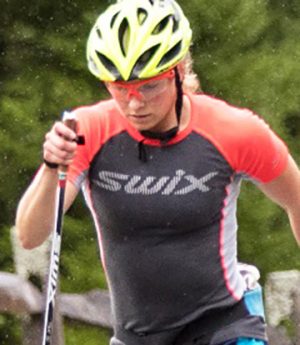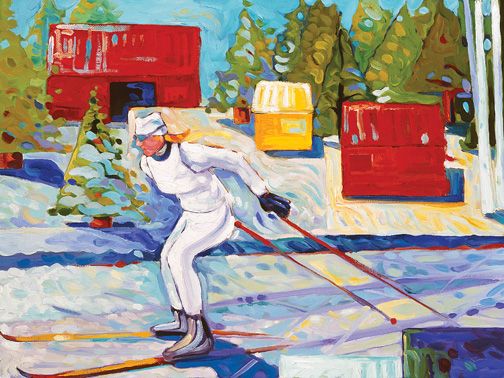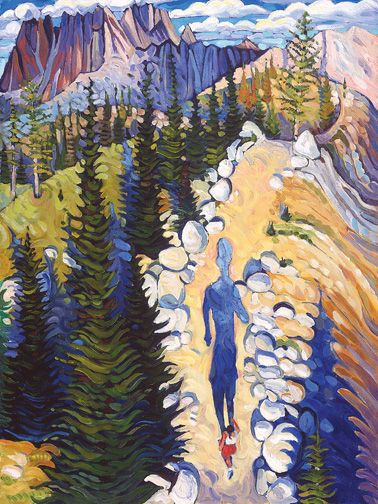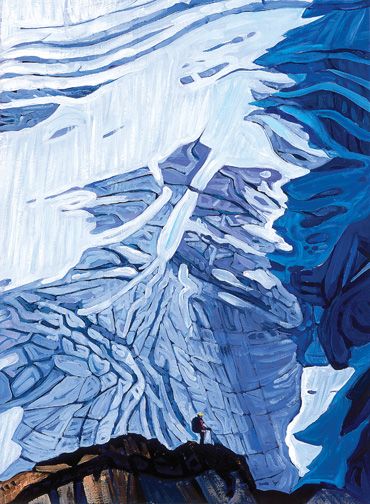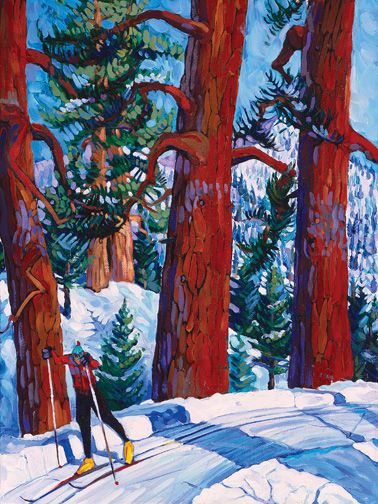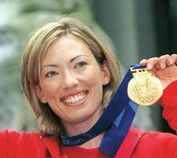Family & Friends & The Early Years
It’s December 2008 as I run into Beckie Scott at Kaffe Klatsch, an uber-swank Swiss coffee shop in downtown Davos, Switzerland. Skis are stacked beside the outdoor cafe patio. It’s clear and cool outside, with the occasional light cumulus cloud affording a place for the sun to hide from time to time. Inside the cafe, it’s bustling. The place is packed. Beckie picks up a slice of chocolate-on-chocolate cake and cappuccino. We find a table. Conversation ensues.
Becky, how did a young girl from Vermilion, Alberta get involved in cross-country skiing? I can’t imagine Vermilion was the biggest hotbed of Canadian skiing.
Beckie Scott: No [laughs]. I got into skiing through my mom and dad, who started the Jackrabbit Club in Vermilion when they first moved there. They cut the trails, started the club. They were both active cross-country skiers. They both raced and are just very-outdoors-type people, so I was always encouraged to be outside — hiking and canoeing in the summer, skiing in the winter.
From Vermilion, you joined the World Cup circuit, the World Championships and the Olympics. Did you have Olympic dreams back then?
BS: Oh, yeah.
Do you remember when these began?
BS: The Olympic dream started almost right away. I was young kid, maybe five or six years old. Once I was able to cruise around on the trails by myself and started hopping into races, I had Olympic thoughts. My dad was a real Olympic fanatic. During the Olympics, the television was always on. My family was really into sports — especially my dad. We were crazy about sports in our house.
Did you ever lose this feeling?
BS: No. It always felt realistic. I realized that it would take some time; that I’d have to be older. I continued to do typical kid’s stuff as well. I participated in lots of different sports — it’s not like I was training for top-level skiing when I was five [laughs]. But being an Olympian is what I always wanted. I never lost this feeling.
Your parents had a big influence on your aspirations in sports. But why did skiing have such an appeal?
BS: Actually for a long time, I was a swimmer. But in swimming you have to show talent early on to be picked up and moved along the development pipeline. As a swimmer, I probably wasn’t that talented and realized that I wasn’t going far in swimming. But in skiing I could see I had a little more potential. I was into skiing because I loved the sport. At the same time, I wanted to win races, be successful and pursue a field I was really good at. Skiing provided the best avenue for these goals.
So skiing had a more relaxed, perhaps an enlightened process of developing its young athletes?
BS: Skiing didn’t have that super-competitive vibe as early on, and I liked the people and personalities better in skiing. They were a little more relaxed, a little less intense. Swimming is lap after lap in a pool. Skiing, you’re outside. You’re cruising through the trails, you see different things and use different techniques all through the course. I just liked skiing better.
You got your first start with the club your parents started in Alberta. Were your parents your first coaches?
BS: I’d say so. My mom started the Jackrabbit program in Vermilion — that’s really similar to the Bill Koch Youth Ski League in the States. This was really informal cross-country ski training.
When I was 12, Les Parsons moved to Vermilion and took over coaching the junior ski team. It was perfect timing. I was just coming to that age and stage of getting a little more serious about racing. This is when things changed for me, and my skiing really took off. Les became a super influence in my life and my career, and continues to be.
Skiing became more formal. We’d meet twice a week for practice. In between, he’d suggest workouts and introduced a little more professional approach to training. He pushed us hard. But he also kept it fun. Les is a great guy with a great sense of humour. We were always laughing.
Do you still have contact with him?
BS: Yes, I still do. He’s like my older brother — or an uncle. I’m going to have Teo [Beckie’s young son] call him “Uncle Les.”
Is he still coaching?
BS: Yes, he’s still coaching and was coaching in Quebec. Most recently, he was Alex Harvey’s coach for many years. Now, he’s moved back closer to his family in Edmonton.
You once told me that Pierre Harvey [Alex’s dad] was one of your childhood heroes. Aside from being a Canadian star in a Euro-dominated sport, what made him someone you looked up to?
BS: You know, that was it. I didn’t know Pierre. I’d never met him. There was this big age gap, obviously. But to be able to open up a newspaper in Canada and read about a top cross-country skier was really unique. To have someone in my sport, from my country, being successful inspired me.
Do you remember the first time you met Mr. Pierre Harvey?
BS: I do. It was in Thunder Bay [Ontario] at a ski race. He’d retired the year before. I remember him coming up and asking me and Sara [Renner], “Do you enjoy the lifestyle as a ski racer?” We said, “Oh, yeah.” We were really young. He said, “You should.” He said it in a way that said more than the words themselves — that you needed to enjoy the lifestyle to find success in skiing. And that not everybody has this opportunity — that this is a unique experience, and to cherish it. Being retired, I think Pierre was speaking from the perspective that once you left the ski-racing days, you’d miss them — that the days of being a ski racer are about as good as it gets. With this, comes the responsibility to remember to cherish them.
Tell us more about your family. Back in the day, your dad escaped from the East German town of Heilingstadt near Oberhof.
BS: At 14, the orphanage kicked him out and he escaped across the East German border. He worked in a West German displaced-persons camp until he raised enough money to come to Canada.
Initially, he settled in Jasper, Alberta. He worked in logging camps and learned English. Eventually, he worked as a park ranger before going back to school in Edmonton. He met my mom in Edmonton, got married and moved to Vermilion.
Scott — that’s not a traditional German name.
BS: No [laughs]. My dad changed his name when he first landed in Halifax. He was really ashamed of what the Germans were doing — what was happening there — and he didn’t want to be associated with that. He was fearful of North American perceptions of Germans at that time. His last name was Schultz. He picked up a phonebook, drew out his finger and landed upon Scott. That’s the story.
Your mom grew up on the Alberta prairie. I’ve heard this was a hard life.
BS: Yes. My mom grew up as part of a very poor grain-farmer family. She was the oldest of four and worked very hard from the time she could, to the day she left for college. They grew up with no plumbing. When my mom talks about it, it’s pretty incredible to hear what it was like to grow up so poor. Food was tight and there were no luxuries whatsoever.
Do you feel these parental influences instilled a certain character that helped you have a successful sport career?
BS: Probably. My parents were very determined and goal-oriented. My dad obviously knew what he wanted, where he was going and how he was going to get there. My mom’s story is the same in many ways. She was not expected to go on to get a college education, work as a professional, but she did. She realized she could do a lot more with her life.
Les Parsons gave you a book after a really rough season.
BS: I had been sick for the year — I had mono — and Les gave me a copy of the second edition of The Pursuit of Excellence by Terry Orlick. This book — I was really, really inspired by it. I came away intrigued by the power of the mind and the role psychology can play in your athletic career. I loved that book. I consulted it as much as I could.
Another edition came out the year before the Salt Lake Olympics. I read that. At the end of it, there was a website. I contacted Terry through his website. At that time, he had an online workshop. I did this. I then asked him if he wouldn’t mind working with me on a personal level. He agreed. We worked together for five years.
It seemed later and later into your career you started stringing together great races every single weekend. Instead of getting one good race here, another the next year, there was a lot more consistency in your results.
BS: Yes. That’s exactly how I feel too. Ultimately, I’d say this happened because I was totally committed to ongoing learning, 100%. I took lessons and learned things from every experience and applied them, both the good and the bad.
I went through an evaluation process after every race. It had three questions. One, what went well? Two, what didn’t go well? Three, what will I need to do better for next time? I did this in training. I did this after races. I did this year after year after year. Eventually, I just started to put it together.
These three questions, did you write these answers out in a book that you kept with you?
BS: Yes. For five years, I worked very closely with Terry, from the year before the Salt Lake Olympics to my retirement. I would email him every one of my evaluations. This was an element to achieving consistency in success.
In addition to this, there was finding the right training, the right physical preparation to get the most out of myself. This is a process every athlete has to find on their own. There is only so much a coach can do for you. Then it becomes a really intuitive, very self-directed experience if you’re on and dialed in. I was totally committed to answering this, “How am I going to get the most out of myself?”
And professionalism. I really viewed skiing as a profession, and I was after success in my profession. I wasn’t just a skier on the World Cup for the good times. I really wanted to ensure that when it was all over, I could say I did what I could do to get the best out of myself. This means in everything, in leaving no stone unturned. Psychology to nutrition and everything in between needed to be addressed.
Were you this way when you were 18?
BS: No.
At what time did this change?
BS: The process started before Salt Lake City. The podium at the pre-Olympics, the year before Salt Lake, really changed things for me. This was my first podium, my first World Cup medal. It was on the Olympic course. I suddenly started thinking, “Holy cow, what if I could win an Olympic medal?” This wasn’t a belief I’d put my life on the line for, but at the same time in the back of my mind I was thinking, “You know, I bet I can. If I do all this stuff and execute it near flawlessly, if I spend more time out at Soldier Hollow than anyone, if I looked into everything I could leading up to the day of the race, then maybe it could happen.”
Beckie Scott is the first North American to win Olympic gold in cross-country skiing. At the 2002 Games in Salt Lake City, UT, Scott was first awarded the bronze medal in the women’s 10km pursuit. When the two skiers ahead of her were caught doping Scott pursued a two-year process that saw her awarded the silver and then the gold.
Go to Part 2.


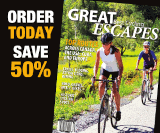

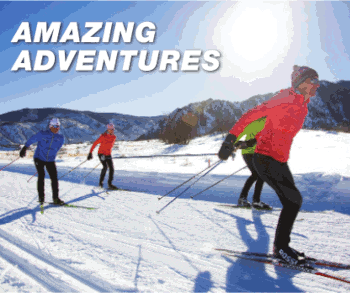
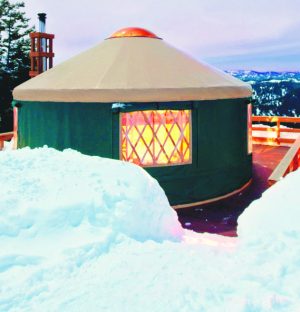
![National camp action [P]...](https://skitrax.com/wp-content/uploads/2019/08/Duluth-4-2019-08-08-at-10.46.51-AM-300x246.png)
![Matt Liebsch on the CXC Elite Team [P] CXC...](https://skitrax.com/wp-content/uploads/2019/08/Matt-Liebsch-CXC.2-525x700.4-300x267.jpg)
![Dan LaBlanc [P]...](https://skitrax.com/wp-content/uploads/2019/08/Dan-LaBlanc-img_1855.3.jpg)
